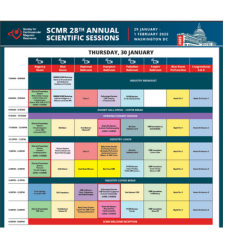Rapid Fire Abstracts
Early Detection of Chemotherapy-Induced Cardiotoxicity Using CMR: A New Paradigm for Cardio-Oncology Care (RF_FR_362)
- AA
Arif Albulushi, MD
Assistant Professor and Consultant
National Heart Center, The Royal Hospital, Oman - AA
Arif Albulushi, MD
Assistant Professor and Consultant
National Heart Center, The Royal Hospital, Oman - AS
Ahmed Shams, MD
Specialist
National Heart Center, The Royal Hospital, Oman
Presenting Author(s)
Primary Author(s)
Co-Author(s)
Cardiotoxicity resulting from anthracycline-based chemotherapy remains a significant contributor to long-term morbidity in cancer survivors. Early detection of subclinical myocardial injury is crucial to initiating timely interventions. Cardiac magnetic resonance (CMR), with its advanced tissue characterization capabilities, offers superior sensitivity in detecting early cardiotoxicity compared to conventional echocardiography. This study evaluates the utility of CMR-based T1 mapping and its correlation with ejection fraction (EF) reduction and biomarker changes.
Methods: A total of 75 patients undergoing anthracycline-based chemotherapy were enrolled in a longitudinal study. Patients underwent baseline CMR imaging followed by serial evaluations at 3- and 6-months post-chemotherapy initiation. T1 mapping was performed to quantify myocardial fibrosis, while changes in left ventricular ejection fraction (LVEF) and biomarkers (troponin) were also measured. Statistical significance was assessed using paired t-tests and ANOVA, with a p-value < 0.05 considered significant.
Results: At 3 months, 35% of patients demonstrated elevated T1 values, while 10% showed a reduction in EF, and 15% exhibited increased troponin levels. By 6 months, 55% of patients had elevated T1 values, with significant progression (p< 0.01), while 25% showed reduced EF and 40% had increased biomarkers. T1 values showed the strongest correlation with subsequent EF reduction and biomarker elevation (r=0.78, p< 0.01). Early intervention in patients with elevated T1 values prevented further clinical deterioration, highlighting the predictive power of CMR for detecting cardiotoxicity before symptomatic heart failure.
Conclusion: CMR-based T1 mapping is a highly sensitive tool for the early detection of chemotherapy-induced cardiotoxicity, offering a predictive measure that outperforms echocardiography and biomarker analysis. Routine incorporation of CMR in cardio-oncology care could facilitate earlier intervention and improve patient outcomes.

